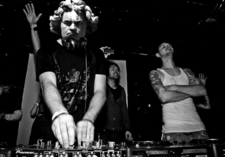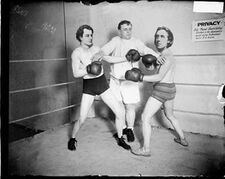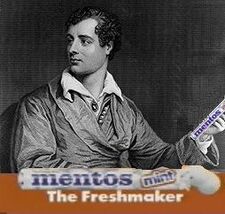Byronic hero

“I would make any sacrifice but this; twenty times I can stake my life, even my honour, but my freedom I shall never sell. Why do I prize it so much? ... What am I aiming at? Nothing, absolutely nothing...”
Many great thinkers have transposed themselves onto the Byronic hero[1] both as an archetypal platform for their frustrated over inflated egos and a reason to reject perceived authorities.[2] Highbrow teenage rebellion is best understood as personifying the Byronic hero. In most, if not all real life and fictional Byronic heroes are far from being teenagers and should have grown out of it in their late teens and early twenties.
It is a common misnomer to confuse the Byronic hero with the Anti-Hero mode, the difference is that while the anti-hero has some genuine moment of altering his path, the Byronic hero is too preoccupied with power and sex to grasp this and so remains static and shallow.[3]
The Man
The man who gave us the 'Byronic' hero was the writer-poet-poser Lord George Byron (22 January 1788 – 19 April 1824). A celebrated English wit of the Romantic era and a man who could talk any woman (or man if it was winter) out of their clothes and into his bed within five minutes.[4] Under a less fortuitous providence, Byron would have spent his life in that era getting drunk and passing out in the smartest drawing rooms of London. He was rescued from aristocratic obscurity by consensual incest with his sister and a love of literature.
Though it is alleged Bryon's best works were burnt by his blushing publisher after his death, the poet spent just enough time away from whoring and gambling by creating the original Byronic hero: Himself. Mad, bad and arguably 'The Michael Jackson' of his era. Byron's legacy through his anti-hero narrative can be traced along fact and fiction as the readers of the recent Twilight books usually miss due to their lack of erudition.
In Fiction
Lord Byron's ambition was to revive the homosexual traditions and culture of ancient Greece. This classicist streak is more of a tendency to look to another culture in hope of being better acclimatized to ones own culture. It was a long journey for Lord Byron to eventually come to the knowledge that many in his social class were exactly this way in the first place, but were less openly Gay, self-absorbed and sociopathic.
Typical leitmotifs of a Byronic hero include: Disrespecting authority, high minded ideas, educated/free sprit, being morally reprehensible under the edicts imposed on the culture of the heroine, flawed anti-hero properties and last but not least, a poor ability to grin and bear it like rest of the great unwashed. The worship of the ego is also partly a rally call against modernity itself, as the Enlightenment not only freed man from superstition; it created the shackles of industrialization and the rise of capitalism.
These constraints of modernity created a new hero. One that in the "Satanic Mills" of industry negated the individual - Byron's 'ideal man' was that this "New Greek" man would quite literally bugger humanity back into pluralism of the soul, a uni-culture[5] of the west. This ideal would though art, lead men away from the mind destroying wheels of mechanization.
The Woman Question
Most Byronic Heroes are fuelled by sex in lieu of any other drivers or idealism beyond contemplating the flaws in Immanuel Kant or some such useless exercise. As such, many such as Don Juan, Rodion Rasklnikov, Eugene Onegin and Hyperion are all mostly driven by the ‘Need for Venus'. While a more complex analysis often leads to sex as a pathology latent in the protagonist's character, one should never misinterpret a seedy young man as anything other than what he is: a seedy young man with a fine grounding in classics and the arts.
What is crucial in fulfilling the Byronic Heroes role is a self-indulgent sense of Freedom. Quite beyond any analysis is exactly what kind of freedom is dictated and indeed most Byronic Heroes are attracted to the Ineffable as they broodingly mirror Heathcliff in some attempt to attract the more impressionable members of the opposite sex. As is often the more ideal, members of the opposite sex who bank on a quick lay before our Promethean Man descends down the rope in the closet he has made for himself. Women and sex are the core of the Byronic hero's character who is usually a euphemism for libido, I.E. Frankenstein’s Monster:
- "Hegel's A=A[6] formula for 'Absolute Spirit' is codified in my mathem of Φ thus introducing a libidinous formulation in the phallic substitutions, such as strumpets"[7]
The above 'syllogism' was just one of Jacques Lacan's obfuscating formulas for describing the Byronic heroes and their place in explaining the Hegelian dialectic of desire as manifested in modern works by pretentious hipsters as post-structural charlatans.[8]
Others revel in the whole concept of rejection of a romantic interest, often revolving around freedom or morality, much like the maternal conflict in Philip Roth's Portnoy's Complaint - but with the exception that the hero must be more than just a man, he must embody the ideals of "Freedom". Few better examples exist other than Pushkin's Eugene Onegin whose aristocratic bearing and perchant for duels and other traditionally manly activities were perceived by many as demonstrating that men were wild and free. Also that he rejected the love of his life based on a personal set of ideals made his self-centred egotism raised to a new paragon of heroism. Something a shallow, selfish[9] character like Byron himself would appreciate.
Modern works
With the advent of the Ipod era, there is little doubt that the Enlightenment never ended and the glorious era of progress has continued with heroines such as Byron being deified in history. The world of consumerism has also meant that a while new propaganda is needed to formulate the desire necessary for their products and the concept of the hero who embodies the nihilistic and defiant qualities exhibited by the Byronic hero reflects the need of a society that sells more 'lifestyle choices' to its people as opposed to the 'afterworld riches through penitence' offered pre-enlightenment. In history, the spiritual poverty that the Byronic hero was meant to remedy via theatricality and dandyism was subverted to perpetuate the mindless sprawl of shallow pleasures and grocery souls.
Critics of modernity see the Byronic model as transcending the Don Juan archetype and embodying the first real tier of delusions focused on the ego, as Friedrich Nietzsche points out,
- The Byronic vision of the great man is not a just a moron with an ego, he's also a rip off of the Greek ideals.[10] If those boy lovers turned down the structured Apollonian vision then so does the enlightenment, albeit continuing their own brand small decadences such as faith in science and a hot, wet flange to cure the "intellectual" ailments of men.
Most heroes in modern fiction often have the leitmotif of the Byronic hero simply because of the ethical deficit in modern western culture as Aristotle’s Virtue ethics have paved way for a cheaper, emotionally stunted Randian vision of ethics. This dystopian worldview of the soul has led to creation of real life heroes such as Jimmy Wales, Bill Gates and poisonous sociopaths in the form of the so called 'Oligarchs'. Journeyman narratives are somewhat absent in the Byronic Hero. Arguably the romantic element fuels only a cult of the ego, something all too apparent in television shows such as America's Got Talent.
In Music: Narcissism refined to Expressionism

The model of Deep Representation in music preached by Arthur Schopenhauer ushered in a whole new perspective on the Byronic hero within modernity. It had a new application of what might be called the proto-Hipster who perceived music not only as legitimate interest for the two dimensional character but also as a means of expression. This view of music and the return to Greek ideals is precisely the aims of Byron whose escapades in Greece were one of the earliest authentic PR stunts by a "poet"
This is probably best represented in the works of Richard Wagner, the original death metal musician. His Gestamkunswerk found in Der Ring des Nibelungen highlights areas that include the veneration of archetypal forms that idealise the individual while placing the mass of humanity at odds with the heroes they look to save them. Siegfried's quest in Wagner's opera is another facet of the Byronic Hero, whose quest is in opposition to the Gods, strange water pixies and scary women with Viking helmets.
In more recent times, hits by artists such as Nicky Minaj also place emphasis on the flawed hero, but by the same token highlight the sheer ugliness and repugnance of a "Greedy Negress" and in doing so, ameliorate the justified racism that Richard Wagner was all to keen to point out in his fascist operas.
Footnotes
- ↑ Pronounced like the bi in bisexual, ron as in Ronald Reagan and ic as in Ike Eisenhower.
- ↑ Authority can take many forms, but usually this should be the construed as some kind of sexual prohibition - an ideal foil for the sexually ambiguous and overly sentimental.
- ↑ Much like the characters in The OC.
- ↑ This was a time of loose clothing. Corsets came in with the Victorians.
- ↑ This 'arty' world view was later used by the popular Rock Star politician Adolf Hitler to justify turning Europe into a Jew cooker.
- ↑ As a side note, Georg Hegel was the founder of the Arseholes Anonymous (AA), later known as an internet hacking group.
- ↑ Écrits, Jacques Lacan, 2003, Routledge
- ↑ Still not getting it? That's the point...
- ↑ Sibilance darling, all the poets in high society do it.
- ↑ Read Pedastry in "ideals"
See also
- The Byronic Hero at Wikipedia
| Featured version: 20 March 2012 | |
| This article has been featured on the main page. — You can vote for or nominate your favourite articles at Uncyclopedia:VFH. | |


